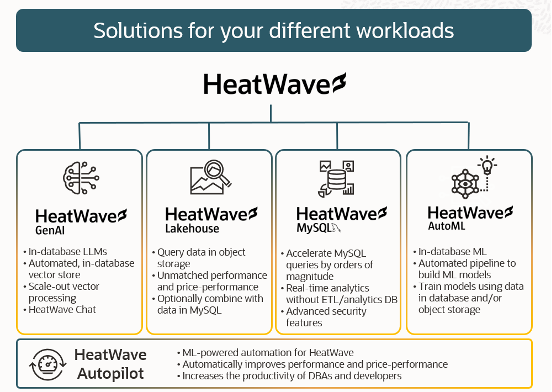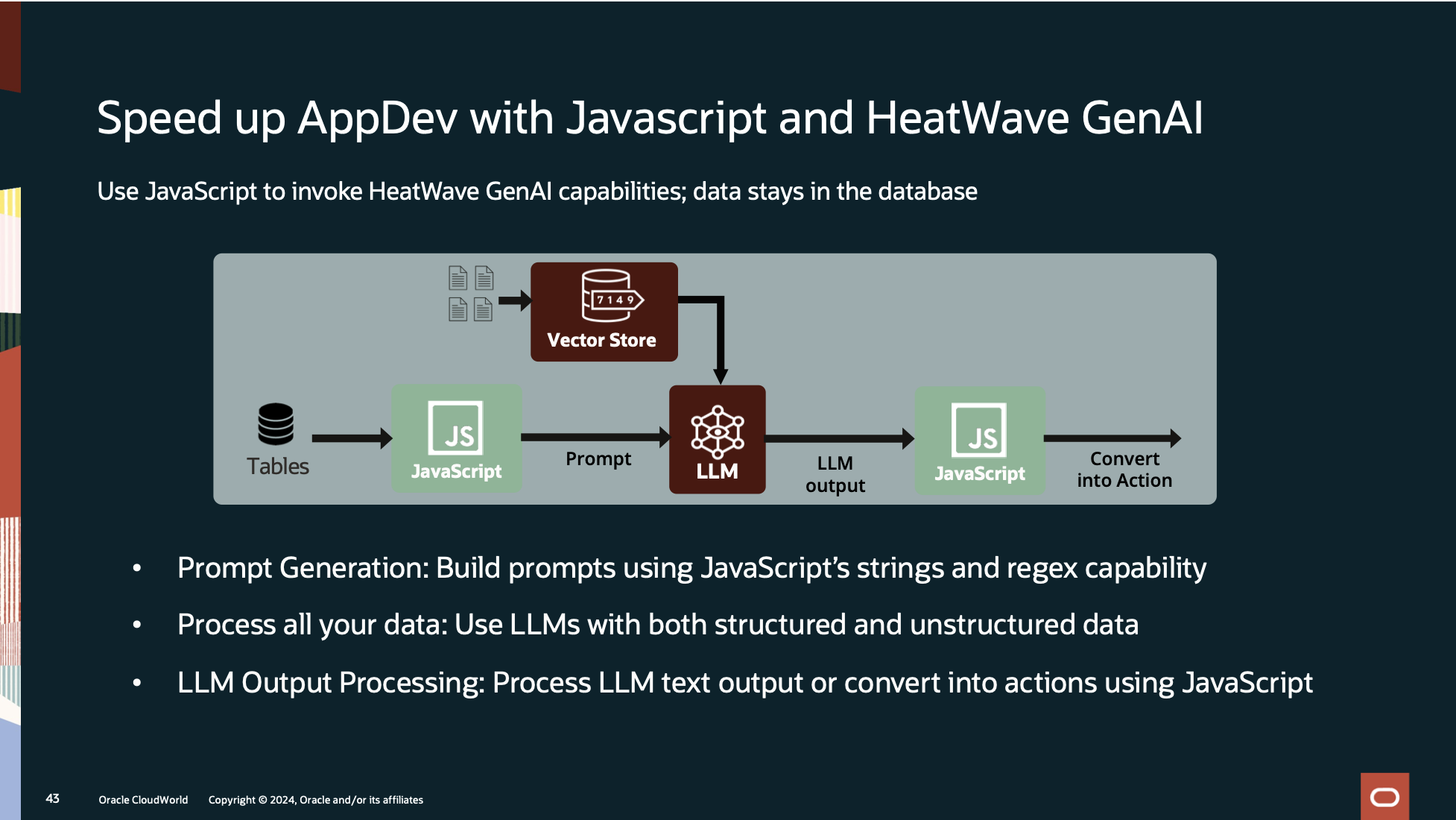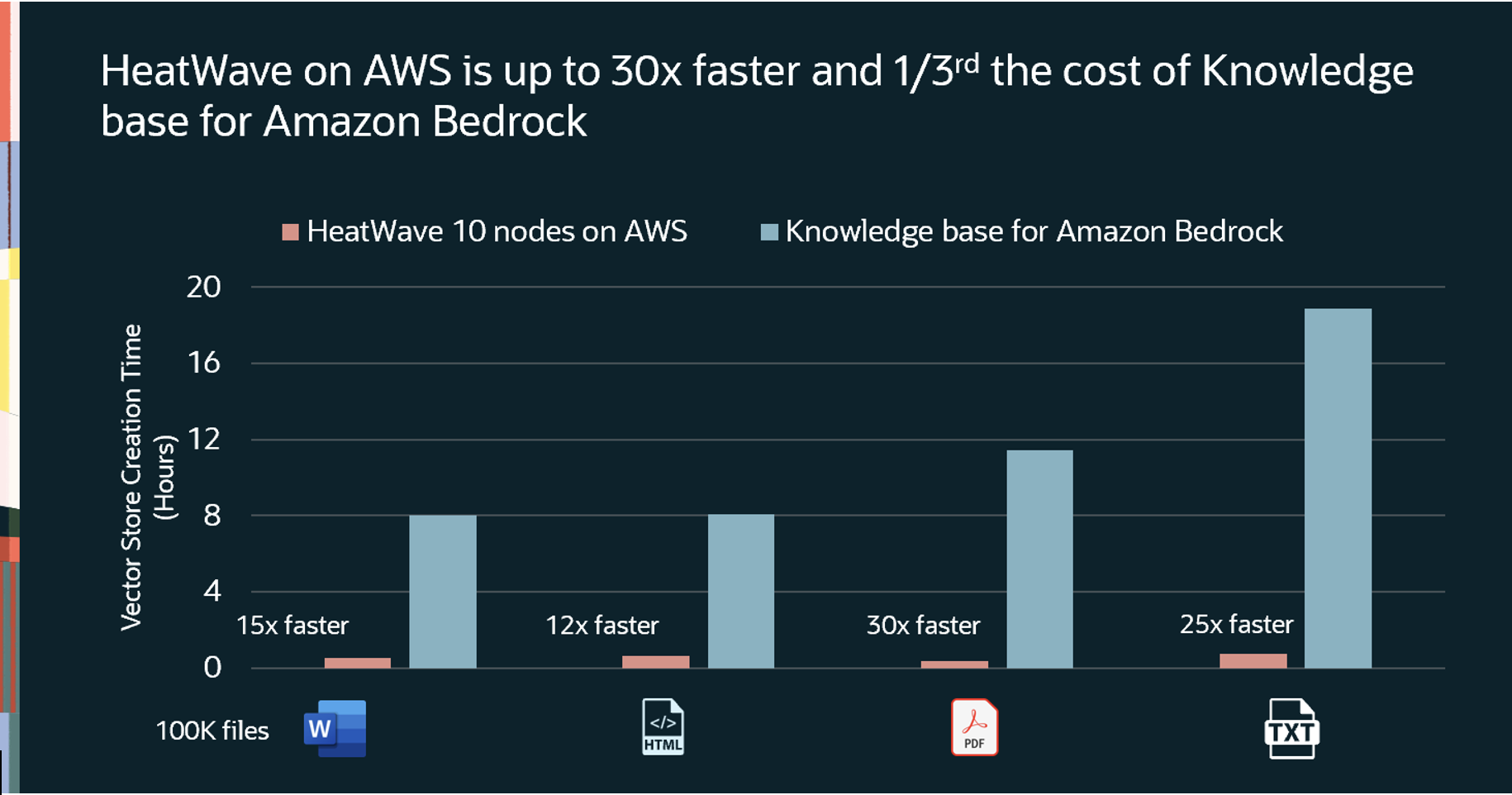Oracle HeatWave provides automated, integrated, and secure generative AI and machine learning in one fully managed cloud service for transactions and lakehouse-scale analytics. Its scale-out architecture is designed to very effectively process and query data in various formats in object storage and MySQL Database.
With solutions for different workloads, HeatWave enables customers to:
- Simplify secure AI innovation with built-in LLMs, vector store, and ML.
- Get faster insights from all their data with the best performance and price-performance for data warehouse and lakehouse workloads.
- Deploy HeatWave-powered apps in Oracle Cloud Infrastructure (OCI), Amazon Web Services (AWS), Microsoft Azure, and in customer’s data center with OCI Dedicated Region and Oracle Alloy.

New features are available across the HeatWave portfolio, for HeatWave GenAI, HeatWave Lakehouse, HeatWave MySQL, and HeatWave AutoML—on both OCI and AWS. They help customers:
- Use HeatWave for a wider variety of use cases
- Simplify application development
- Improve performance
- More easily migrate from Amazon Aurora/RDS
Before we dive into the details of the enhancements, I am pleased to announce that HeatWave is now available as an Always Free service on Oracle Cloud Free Tier. All OCI accounts, free and paid, get access to a HeatWave instance in OCI in their home region, along with 50 GB of storage and 50 GB of backup storage, for an unlimited time. They also receive $300 of credits to use for all eligible OCI services for up to 30 days.
This enables organizations to run small-scale applications accessing data from object storage and MySQL Database using HeatWave MySQL, JavaScript, Analytics, HeatWave Vector Store, and HeatWave Lakehouse. Organizations can also build machine learning models with HeatWave AutoML and experience how HeatWave Autopilot can help save significant time for developers and DBAs.
HeatWave GenAI
HeatWave GenAI provides integrated, automated, and secure generative AI with the industry’s first in-database large language models (LLMs); an automated, in-database vector store; the industry’s best performance and price-performance for vector processing (similarity search); and the ability for customers to interact with their unstructured documents in HeatWave using natural language. HeatWave GenAI securely brings the power of generative AI to enterprise data without requiring AI expertise, data movement to other services, or additional costs.
Use HeatWave for a wider variety of use cases
The following enhancements help organizations use enterprise documents in different languages and modalities for Generative AI applications:
- Multi-lingual support: HeatWave GenAI now can support documents in 27 languages for vector creation, similarity search, and natural language interaction—helping developers build global applications. Customers have the flexibility to invoke LLMs of their choice (either in-database LLMs or external LLM services available through OCI Generative AI).
- Optical Character Recognition (OCR) support: Many organizations receive information via printed media such as invoices, contracts, and other documents. They often store these documents by scanning them into a digital image format. With OCR support, HeatWave GenAI can now convert the text information in these scanned documents into vector embeddings, enabling organizations to query the documents to perform similarity searches and retrieval augmented generation (RAG).
Simplify application development
Generative AI is a new technology and developing GenAI applications typically requires AI expertise. In-database JavaScript support for GenAI makes it easier for developers to build GenAI apps using HeatWave GenAI.
Last year we introduced JavaScript support in HeatWave MySQL, allowing users to write stored procedures and functions in JavaScript and execute them natively inside the database. As LLMs primarily handle textual and JSON data, JavaScript is a natural choice to invoke them. We’ve added native support for the VECTOR data type in JavaScript and the ability to invoke GenAI capabilities from a JavaScript program. This allows developers to preprocess prompts based on SQL data, invoke LLMs directly within the database, and post-process the responses.

Improve performance
Improving the HeatWave GenAI in-database LLM performance and throughput helps organizations handle more requests at lower cost. HeatWave GenAI now supports LLM inference batch processing, which enables HeatWave to efficiently process multiple GenAI LLM inference requests simultaneously. Multiple queries run in parallel across different nodes in the HeatWave cluster, improving LLM inference performance and throughput while keeping the inference latency of each request unchanged.
HeatWave MySQL
HeatWave MySQL enables OLTP workloads to leverage the Enterprise Edition features of MySQL Database, along with unique capabilities such as Auto Shape Prediction, Auto Thread Pooling, Autopilot indexing, and in-database JavaScript. It also allows customers to improve MySQL query performance by orders of magnitude and get real-time analytics on transactional data—without the complexity, latency, risks, and cost of ETL duplication to a separate analytics database.
Improve performance
The following features help provide higher performance and throughput for OLTP workloads:
- Hypergraph-based optimizer for MySQL: We are now introducing a new hypergraph-based optimizer that uses true cost-based optimization to guide the join search space and produce optimized join query plans. This can help improve the performance of complex queries, particularly for those involving joins.
- Bulk ingest: For customers who want to import a large amount of data upfront into their MySQL Database, we now enable “bulk ingest” at the instance creation time. This is done by parallelizing the insertion of the data into the table. Ingestion performance can improve by up to 5X in some workloads, regardless of whether the source data is sorted or unsorted. For example, for the TPC-H LINEITEM table, the time to load data improves from 90 minutes to 18 minutes.
Improve manageability and availability
- OCI Ops Insights integration: The Operations Insights service (Ops Insight) is an extension to the OCI Database Management service, which provides fleet monitoring and database performance management capabilities for HeatWave MySQL. Ops Insights provides ML-based resource usage trends and capacity planning, data explorer-based performance analysis, and dashboard capabilities for HeatWave MySQL. This enables DBAs to predict consumption for cost control and predict workload patterns for performance and scalability improvements.
- Cross-region backup for disaster recovery: To enhance data durability and disaster recovery capabilities, HeatWave MySQL now offers cross-region backup, where MySQL backups can be copied from one region to another. If data centers in the region where HeatWave MySQL instances are deployed become unavailable, customers can use the cross-region backup to restore the HeatWave instances in another region with minimal data loss. Cross-region backups support OCI Identity policies, which allow organizations to control data movement between specific regions, helping them address data jurisdiction regulations.
HeatWave Lakehouse
HeatWave Lakehouse enables users to process and query hundreds of terabytes of data in the object store—in a variety of file formats including CSV, Parquet, Avro, JSON, and exports from other databases such as Aurora, Redshift, or MySQL. The query processing is done entirely in the HeatWave engine, so customers can use HeatWave for both non-MySQL workloads and MySQL-compatible workloads alike. With HeatWave Vector Store, they can upload and query unstructured documents. Customers can also take advantage of HeatWave AutoML to build, train, and explain ML models using data in object storage, the database, or both.
Use HeatWave for a wider variety of use cases
We are introducing the capability to write results to object storage. HeatWave writes query results in parallel across the HeatWave cluster, allowing organizations to efficiently store data in object storage at a low cost. Users can easily share query results across audiences and applications, and it opens opportunities for new transformation use cases, such as MapReduce applications.
Simplify application development
With the introduction of incremental change propagation, HeatWave Lakehouse will only update the changes made in data stored in HeatWave (Lakehouse tables) without the need to reload the whole data set. HeatWave Lakehouse automatically determines which files have been added/changed. Ingesting new data objects into HeatWave Lakehouse scales across the HeatWave cluster, delivering the same high load performance as for initial table loads. This makes updating HeatWave Lakehouse data very efficient.
HeatWave AutoML includes everything users need to build, train, and explain machine learning models within HeatWave, at no additional cost. Customers can avoid the security risks and costs of moving data to a separate machine learning service. They can easily apply machine learning training, inference, and explanation to data stored in object storage or MySQL Database.
Use HeatWave for a wider variety of use cases
- Topic modeling: Helps users discover insights in large textual data sets by helping them understand key themes in documents. For example, an e-commerce website could use this feature to automatically categorize new products by identifying key themes in the products’ descriptions.
- Semi-supervised log anomaly detection: Enables users to provide feedback on the results of unsupervised anomaly detection and use this labeled data to help improve subsequent predictions.
Simplify application development
- Data drift detection: Helps developers build ML applications delivering more accurate predictions over time. Data drift detection helps developers determine when to retrain ML models by detecting the differences between the data used for training and new incoming data, which can help improve the ML model accuracy over time.
HeatWave on AWS
HeatWave is available natively on AWS; the data plane, control plane, and console reside in AWS. This eliminates any data transfer outside of AWS, allowing AWS-based applications to seamlessly leverage the benefits of HeatWave.
HeatWave GenAI on AWS: integrated, automated, and secure
HeatWave GenAI lets developers build new, secure generative AI applications on AWS without AI expertise, data movement, or additional cost. They can automate vector store creation and vector embedding generation, use in-database LLMs running on CPUs or optionally use Amazon Bedrock foundation models, get the best price-performance in the industry for vector processing, and have natural language conversations with their documents in Amazon S3.
For similarly search, HeatWave GenAI provides 39X better price performance than Snowflake, 96X better than Databricks and 48X better than Google BigQuery. Vector creation with HeatWave is up to 30X faster and 1/3rd the cost of Knowledge Bases for Amazon Bedrock.

HeatWave Lakehouse on AWS: Query files on S3
HeatWave Lakehouse enables AWS users to query several hundred terabytes of data in Amazon S3—in various file formats, such as CSV, Parquet, Avro, JSON, and export files from other databases. They can optionally combine queries with transactional data in HeatWave MySQL—enabling them to get faster insights from all their data. This is, of course, in addition to running analytics and machine learning on data stored in MySQL Database
Easier migration from Amazon Aurora and RDS
Many AWS customers running their applications on Amazon Aurora and RDS are looking for a solution to improve their workload performance and provide additional capabilities to support more end-user requirements, without moving data or incurring costs for additional services. We are introducing a set of enhancements that helps them migrate and develop a new class of applications with HeatWave.
- Inbound replication: Inbound replication uses MySQL native replication; it enables customers to setup replication to HeatWave instances. As a result, customers can now more easily perform live migrations from Aurora or RDS to HeatWave. It also allows customers who cannot move their OLTP workloads to HeatWave MySQL to leverage other HeatWave capabilities such as analytics, lakehouse, AutoML and GenAI. These customers can setup inbound replication and only replicate the required MySQL data to HeatWave.
- Javascript stored program support: Developers using AWS can now run JavaScript procedural logic directly within MySQL Database as stored programs. This can help reduce application complexity, the cost of client processing, and network latency. Developers can execute SQL queries within their JavaScript code using an SQL API, seamlessly processing MySQL table data.
- HeatWave Autopilot indexing: HeatWave Autopilot Indexing provides ML-powered automation to help customers optimize the performance of their MySQL OLTP workloads at a lower cost. Customers no longer need to manually identify which secondary indexes are most beneficial for their workload. Autopilot indexing automatically generates secondary index recommendations for creating and dropping indexes based on current workloads and predicts the index creation time as well the expected improvements in performance. It also estimates the storage required and generates explanations for the recommendations made.
- AWS PrivateLink support: Customers can now easily setup AWS PrivateLink between their AWS virtual private cloud (VPC) and HeatWave on AWS instances. This isolates the HeatWave instances from the public internet and all traffic to and from the HeatWave instance occurs within the AWS network.
Key takeaways and next steps
- Oracle unveiled numerous innovations across the HeatWave portfolio. We encourage you to try them out and build small-scale applications using the Always Free resources on Oracle Cloud Free Tier.
- HeatWave GenAI provides integrated, automated, and secure Generative AI – now also to AWS customers. Read the HeatWave GenAI technical brief to learn more and build GenAI apps using step-by-step instructions and sample code.
- Don’t miss Edward Screven’s HeatWave Solution Keynote at Oracle CloudWorld to dive into the latest HeatWave GenAI news, learn how customers succeed with HeatWave GenAI, and see an exciting demo. Join us on Wednesday, September 11 at 8.30 am PT in Ballroom E if you’re in Vegas or online via ClouldWord on Air (get your free pass now!) if you could not travel.
Additional Resources
- Learn more about HeatWave
- Discover the HeatWave MySQL Migration Program
- Request a free HeatWave workshop
